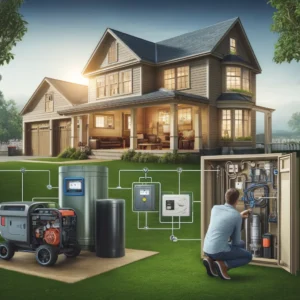Regularly Test Home Backup Systems
The Importance of Regularly Testing Your Home Backup Systems
 Backup systems in your home, such as home generators, standalone generators, and battery backups for sump pumps and other household systems, are essential for maintaining safety and comfort during power outages. However, it’s crucial to regularly test these home backup systems systems to ensure they will work when you need them the most. Here’s why and how you should keep your backup systems in top shape.
Backup systems in your home, such as home generators, standalone generators, and battery backups for sump pumps and other household systems, are essential for maintaining safety and comfort during power outages. However, it’s crucial to regularly test these home backup systems systems to ensure they will work when you need them the most. Here’s why and how you should keep your backup systems in top shape.
Why Regular Testing is Crucial
Reliability in Emergencies Home backup systems are your safety net during emergencies like power outages. If these systems fail when you need them, it can lead to significant inconveniences and even dangerous situations. Regular testing ensures they are reliable and ready to perform.
Prevent Costly Repairs Testing your backup systems regularly can help identify minor issues before they become major problems. This proactive approach can save you from costly repairs or replacements down the line.
Maintain Efficiency Over time, components of your backup systems may wear out or become less efficient. Regular testing helps maintain their efficiency, ensuring they provide the maximum possible support during an outage.
How to Test Your Home Backup Systems
Home Generators
- Monthly Visual Inspection: Check for any visible signs of wear and tear, corrosion, or leaks.
- Weekly Self-Tests: Many modern home generators have self-test modes. Set them to run these tests automatically. Ours runs every Thursday afternoon at 2pm.
- Quarterly Operational Test: Start your generator and let it run for about 30 minutes. Listen for any unusual noises and check for proper exhaust emissions.
- Annual Professional Inspection: Have a certified technician inspect your generator to ensure all parts are in good condition and functioning correctly. This includes changing the oil and making sure the battery is good.
Standalone Generators
- Operational Test: Occasionally start your standalone generator manually to ensure it kicks in without issues.
- Fuel Check: Regularly check fuel levels and replace old fuel with fresh fuel as needed. Make sure to use fuel treatmant if the generator will be sitting for long periods of times between uses. You do not want the fuel lines to gum up on you.
Battery Backups for Sump Pumps
- Monthly Inspection: Check the battery terminals for corrosion and ensure the battery is fully charged.
- Quarterly Water Test: Pour water into the sump pump pit to ensure the pump activates and drains the water properly.
- Annual Battery Replacement: Replace the battery annually or according to the manufacturer’s recommendations to ensure it holds a charge.
Common Issues and Troubleshooting Tips
Generator Won’t Start
- Check Fuel Levels: Ensure there is enough fuel.
- Inspect Spark Plugs: Clean or replace dirty or worn-out spark plugs.
- Battery Issues: Make sure the generator’s battery is charged.
- Check Fuel Lines: If the fuel is old and the generator has been sitting dormant, the fuel lines may need to be cleaned out.
Sump Pump Battery Backup Failure
- Check Battery Charge: Ensure the battery is fully charged.
- Inspect Connections: Look for loose or corroded connections.
- Pump Blockages: Check for debris or blockages in the pump.
Insurance Discounts
Many insurance companies offer discounts for having home backup systems because they reduce the risk of damage and claims. Here are a few examples:
- Home Generators: Installing a home generator can prevent losses due to power outages, such as spoiled food and frozen pipes, making you less likely to file a claim. Some insurers offer discounts for homes equipped with generators.
- Battery Backup for Sump Pumps: These systems can prevent basement flooding during power outages, which is a common and costly insurance claim. Having a battery backup can qualify you for a discount on your homeowner’s insurance.
- Security and Fire Systems: While not the focus here, adding comprehensive backup systems to your security and fire alarm systems can also lead to insurance discounts.
To take advantage of these discounts, contact your insurance provider and provide documentation of your installed backup systems. They can inform you of any available discounts and what proof is required.
Conclusion
Regular testing of your home backup systems, including home generators, standalone generators, and battery backups for sump pumps, is essential to ensure they operate efficiently and reliably. By conducting routine inspections, operational tests, and professional check-ups, you can prevent unexpected failures and maintain peace of mind knowing you are prepared for any power outage. Additionally, having these systems in place might help you qualify for discounts on your homeowner’s insurance, providing further incentive to maintain them properly.
